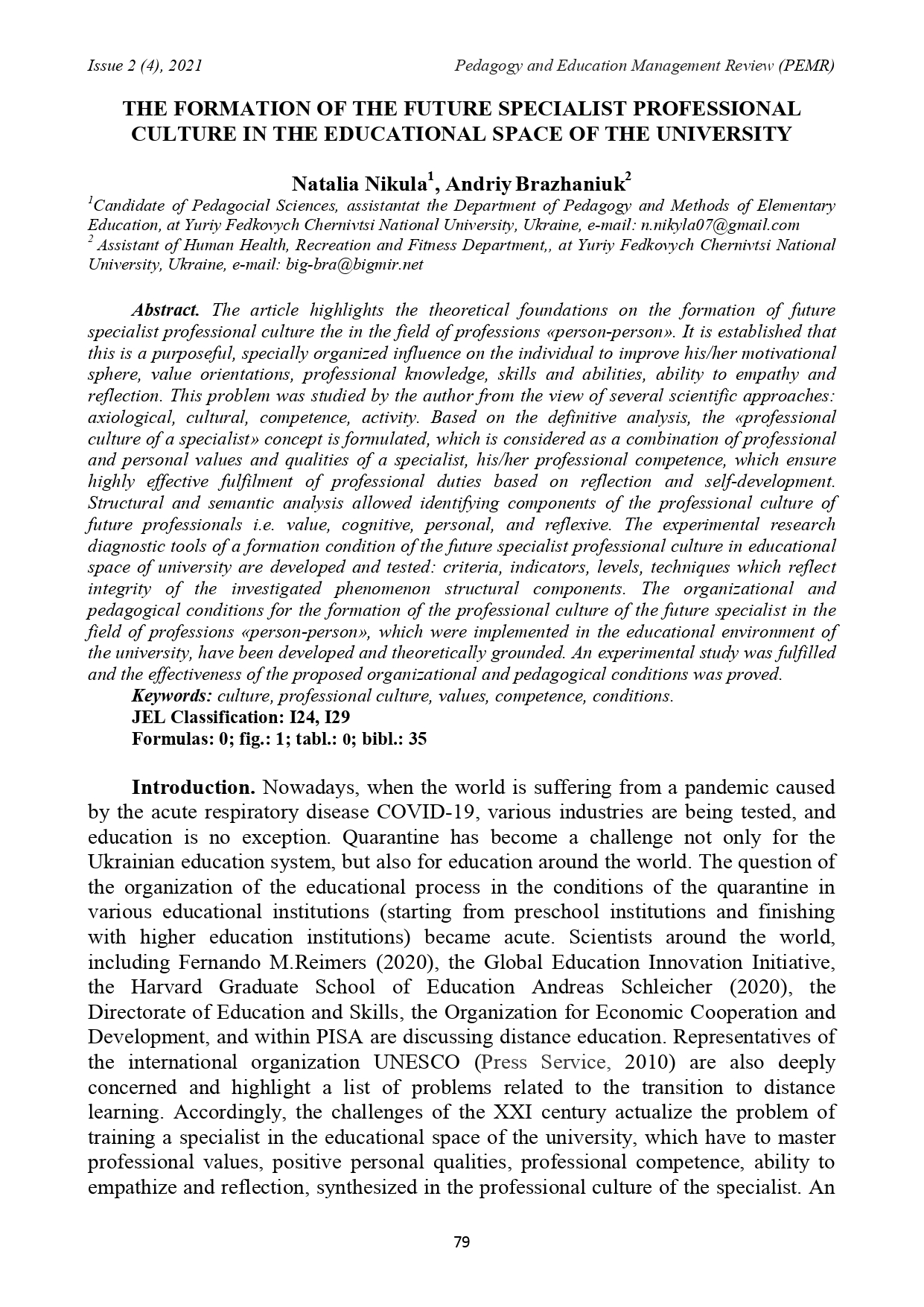THE FORMATION OF THE FUTURE SPECIALIST PROFESSIONAL CULTURE IN THE EDUCATIONAL SPACE OF THE UNIVERSITY
DOI:
https://doi.org/10.36690/2733-2039-2021-2-79Keywords:
culture, professional culture, values, competence, conditionsAbstract
The article highlights the theoretical foundations on the formation of future specialist professional culture the in the field of professions «person-person». It is established that this is a purposeful, specially organized influence on the individual to improve his/her motivational sphere, value orientations, professional knowledge, skills and abilities, ability to empathy and reflection. This problem was studied by the author from the view of several scientific approaches: axiological, cultural, competence, activity. Based on the definitive analysis, the «professional culture of a specialist» concept is formulated, which is considered as a combination of professional and personal values and qualities of a specialist, his/her professional competence, which ensure highly effective fulfilment of professional duties based on reflection and self-development. Structural and semantic analysis allowed identifying components of the professional culture of future professionals i.e. value, cognitive, personal, and reflexive. The experimental research diagnostic tools of a formation condition of the future specialist professional culture in educational space of university are developed and tested: criteria, indicators, levels, techniques which reflect integrity of the investigated phenomenon structural components. The organizational and pedagogical conditions for the formation of the professional culture of the future specialist in the field of professions «person-person», which were implemented in the educational environment of the university, have been developed and theoretically grounded. An experimental study was fulfilled and the effectiveness of the proposed organizational and pedagogical conditions was proved.
Downloads
References
Bibler, V. S.(1989). Dialog of Cultures (Experience of Definition).Issues of Philosophy, 6, 32–42 [in Ukrainian].
Boychuk, Yu. D. (2010).Theoretical and methodological bases of ecological and valeological culture formation of the future teacher.(Author's dissertation of Doctor of Pedagogical Sciences). G. S. Skovoroda Kharkiv National Pedagogical University, Kharkiv [in Ukrainian].
Busel, W. T. (Ed.). (2009). Large explanatory dictionary of the modern Ukrainian language.Kyiv, Irpin: Perun [in Ukrainian].
Caton, M. P. (1950). Agriculture. Moscow, Leningrad: USSR Academy of Sciences [in Russian].
Cicero, M. T. (1825). Tusculanarum Quaestionum ad M. Brutum.Wien, Triest: Geistinger [in English].
Fernando M., Andreas Schleicher, (2020). Aframe work to guide an education response to the COVID-19 Pandemic of 2020 URL: https://www.hm.ee/sites/default/files/framework_guide_v1_002_harward.pdf [in English].
Filipchuk, G. G. (2014) Nation-building of education. Chernivtsi: Zelena Bukovyna [in Ukrainian].
Gerasymchuk, A., Palekha, Y. &Shyyan, O. (2004).Sociology. Kyiv: European University [in Ukrainian].
Isayev, І. F. (2010). Professional-Pedagogical Cultureas an Object of Scientific Research.Theoretical Issues of Culture, Education and Upbringing. 42, 143–147.URL: http://nbuv.gov.ua/UJRN/Tpkov_2010_42_40 [in Ukrainian].
Karpov, A. V. (2003). Reflexivity as a mental property and methods of its diagnosis.Psychological Journal, 24 (5), 45–57 [in Ukrainian].
Khomych, L. O. (1998). Professional and pedagogical training of primary school teachers - K .: «Master – S». - 200 s. [in Ukrainian].
Klimova, E. A (Ed.).(1999). Psychological diagnostics in personnel management. Moscow: RPO [in Russian].
Kornienko, O. M. (1998). National values of the individual: the essence and features of formation. (Author's dissertation of Candidate of Philosophical Sciences). Taras Shevchenko Kyiv University, Kyiv [in Ukrainian].
Kroeber, A. L., Kluckhohn, C. (1952). Culture a critical review of concepts and definitions. Cambridge, Massachusetts. URL: http://www.pseudology.org/Psyhology/CultureCriticalReview1952a.pdf [in English].
Krylova, N. B. (1990), Formation of the future specialist’s culture.M .: Higher School [in Ukrainian].
Law (2014). On higher education. (2014). URL: http://zakon2.rada.gov.ua/laws/show/1556-18
Law (2017). On education. URL: http://zakon3.rada.gov.ua/laws/show/2145-19
Markaryan, E. S. (1983). Theory of culture and modern science: Logic-methodological analysis. Moscow: Mysl [in Russian].
Nichkalo, N. G. (2001). Development of research in Ukraine on the problems of pedagogy and psychology of vocational education at the turn of the century. Kyiv: Scientific World [in Ukrainian].
Ognevyuk, V. O. (2003) Education in the system of values of sustainable human development (worldview and methodological aspect).(Dissertation of Dr. of Ph.D.).Taras Shevchenko Kyiv National University, Kyiv [in Ukrainian].
Pavelkiv, R. V. (2009). General Psychology. Kyiv: Condor [in Ukrainian].
Petinova, O. B. (2002). The problem of value in philosophy.Culture of the peoples of the Black Sea region, 36, 183–188 [in Ukrainian].
Popenko, O. M (2012). Teacher's professional culture as an integrative quality of a professional teacher's personality. Scientific notes of Nizhyn State University. Nikolai Gogol Psychological and pedagogical sciences,1, 44–49.URL: http://nbuv.gov.ua/UJRN/Nzspp_2012_1_12 [in Ukrainian].
Rogov, E. I. (1999). Desktop book of a practical psychologist (Book 2). Moscow: VLADOS [in Russian].
Rubinstein, S. L. (1976). Man and the world. Problems of general psychologists (2nd ed.). (pp. 253–381). Moscow: Academy of Pedagogical Sciences of the RSFSR [in Russian].
Rybalka, V. V. (2009). Axiological bases of psychological culture of personality. Kyiv: [b.v.] [in Ukrainian].
Shadrikov, V. D. (1998). Psychology of human activity and abilities. Moscow: Logos [in Russian].
Slastyonin, V. А. (1993). Formation of teacher’s professional culture.M .: Prometey [in Russian].
Sotskaya, G. I. (2011). Theoretical and methodical bases of formation of aesthetic culture of the future teacher of fine arts.Modern information technologies and innovative teaching methods in training: methodology, theory, experience, problems, 28, 472-477 [in Ukrainian].
Tanchyn, I. Z. (2007). Sociology (2nd ed.). Kyiv: Znanya [in Ukrainian].
Tarasenko, T. V (2014) Formation of the future teachers’professional culture of philological specialties in the process of studying professional disciplines. (Author's dissertation of Candidate of Pedagogical Sciences).Vlolodymyr Vynnychenko Kirovograd State Pedagogical University, Kirovograd [in Ukrainian].
Tereshchuk, G. V. (Ed.). (2007). Formation of professional culture of a teacher in the context of Ukraine's integration into the European educational space, Materials of a regional scientific-practical seminar. Ternopil: TNPU named after V. Hnatyuk [in Ukrainian].
UNESCO, Press Service,(2010). UNESCO rallies international organizations, civil society and private sector partners in a broad Coalition to ensure URL: https://en.unesco.org/covid19/educationresponse/globalcoalition [in English].
Ziaziun, І. А. (2009).Axiological milestones of modern culture.Collection of materials of an international scientific and practical conference.(C. І, с. 37–48).URL: http://lib.iitta.gov.ua/3509/1/%D0%B7%D1%8F%D0%B7%D1%8E%D0%BD4.pdf [in Ukrainian].
Zlobin, N. S. (1980). Culture and social progress. Moscow: Nauka [in Russian].






